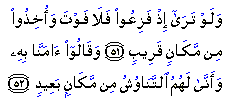Deadly Regret, Exchanging Gifts, Contracts
Issue 376 » April 28, 2006 - Rabi Al-Awwal 29, 1427
General
| Living the Quran |
Saba
(Sheba)
A "deadly regret" means that its effect is akin to the pain of being killed, because the regret of hearts is deadly, particularly when one is certain there is no way to regain what was lost. Also, regret over loss is another loss, as it is said: busying oneself with regret over time lost in the past is wasting the present time! Hence it is said: Time is like a sword, if you do not slay it, it slays you. Time passes naturally, ends automatically, so whoever is not aware of his soul, his time will be lost, his loss will be great, and his regrets will be severe. How will he feel when he realises, when his loss becomes certain, the magnitude of what he has lost? And when he seeks going back and finds it impossible to regain what he has lost? For how can yesterday be returned in a new day?! Source: |
| Understanding the Prophet's Life |
| Exchanging Gifts An effective means of expressing one's love and sincerity for others and for strengthening social relations is to give gifts. Exchanging gifts facilitates mutual love and affection, it also removes bitterness, if any. The Prophet, peace and blessings be upon him, said: "Give presents to one another. It infuses mutual love and puts an end to bad blood." (Mishkat) The Prophet himself often used to give presents to his Companions. The following points emerge from the Prophet's conduct in this regard: 1. Gifts should not be beyond one's means. One should not hesitate to give a present for the simple reason that it is inexpensive. What binds people together is not the value of a gift, but the sincerity and love permeating it. 2. Gifts should be accepted with gratitude. 3. Gifts should be reciprocated and should not necessarily be of the same value. Rather, one should give according to one's means. It was the Prophet's practice both to give and receive gifts. 4. Perfume was often the Prophet's favourite gift. Perhaps now-a-days one may give a good book as a present. Source: |
| Cool Concepts! |
Much of Islamic economics and finance is based on contracts between two or more parties. Whether it is a contract to purchase goods or a contract to make a loan, one needs to understand the concept of contract in Islam. Definition of Contract in Islam The word aqd (contract) in Arabic language means tying tightly, as in tying a rope. Arabs used the word to speak about firm belief or determination. They used to say aqd al ahd to mean ‘make a covenant’ and aqd al yamin to mean ‘give an oath’. Along the same line is aqdat al nikah meaning a marriage contract. The word aqd also carries the meaning of obligations, as used in the first verse of Surah al-Maida: "O ye who believe! Fulfil your obligations." In Islamic jurisprudence the word contract is used to mean an engagement and agreement between two persons in a legally accepted, impactful and binding manner. The pillars of a contract in Islam are two:
The coming together of ijaab and qabool makes up the contract. There are three other conditions that are needed for a contact to be legally acceptable and impactful.
Source: |
